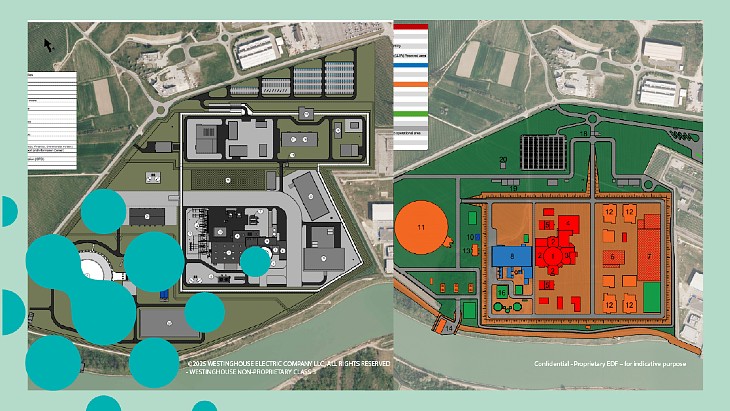It also said the "estimated investment amount is also within the framework of the value of the economic study of the JEK2 project, prepared by GEN energija in 2024" - these ranged from EUR9.314 billion (USD10.1 billion) for a 1000 MW unit and up to EUR15.371 billion for a 1650 MW unit.
Slovenia's JEK2 project is for a new one or two-unit nuclear power plant, with up to 2400 MW capacity, next to Krško NPP which has a 696 MWe pressurised water reactor generating about one-third of the country's electricity. Krško is owned and operated by Nuklearna Elektrarna Krško, which is jointly owned by Croatia's Hrvatska elektroprivreda (HEP Group) and Slovenia's GEN Energija.
In January Westinghouse and EDF were each asked to conduct a Technical Feasibility Study for their reactors at the site. Those have now been published by JEK2.
Vinko Planinc, Head of New Nuclear Facilities for GEN energija, said the studies confirm that the designs "allow for safe and efficient placement in the existing environment, taking into account the requirements for flood and earthquake hazards and with the possibility of minor adjustments".
JEK2 added: "Both technologies envisage cooling with a cooling tower using natural draft, which represents the most environmentally acceptable solution with minimal impact on the Sava River and the smallest carbon footprint." The EPR tower frame height would be 195 metres, the AP1000 approximate tower height 180m, JEK2 said.
It says that both firms are offering a power plant with a design life of 60 years, with extension to 80 years possible. Both companies have said they can build their standard power plant, adapted to the specific requirements of the site, but "to further reduce the risks in the project, both bidders recommend that additional studies be conducted that will enable a higher quality bid preparation with fewer uncertainties on the part of both the bidder and the investor".
Preparations for the JEK2 project have continued despite the postponement last year of a planned referendum on the plan. The indicative timeline is a Final Investment Decision in 2029, with construction beginning in 2033 and commercial operation in 2041.
In a press conference updating on progress, Bruno Glaser, Business Director of GEN energija, said public consultation and information events related to the national spatial plan are taking place until the end of September. A radiological study is being carried out with a report due in October, and public procurement for a Seismic Hazard Study is taking place.
The company also presented an overview of the economics of the project, with Gen energija putting the lowest economically viable cost of electricity from JEK2 as EUR70.2/MWh. It said that an estimate of EUR107/MWh produced by Youth for Climate Justice was higher "primarily from different assumptions regarding the cost of capital". The company also stressed the wider economic benefits for the country’s and the region’s economy.
Slovenia had been due to hold a referendum on new nuclear in November 2024, but that was called off amid a political row over how it was being conducted. Prime Minister Robert Golob said he remained committed to holding a referendum before a final investment decision is taken - which is currently due to be in 2028. There had initially been a third expected bidder in the process - Korea Hydro and Nuclear Power - but it pulled out before it moved to the Technical Feasibility Study stage.





_13505.jpg)
_87975.jpg)
_67826.jpg)
_87695.jpg)






